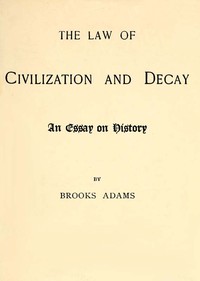The Law of Civilization and Decay: An Essay on History by Brooks Adams
"The Law of Civilization and Decay: An Essay on History" by Brooks Adams is a work of history privately published in 1895. Adams argues that civilizations follow a predictable cycle of rise and fall, driven by economic and social forces. As societies centralize and accelerate through industrialization, imaginative energy transforms into capital accumulation, causing profound shifts in human temperament and power. Through examples spanning from Rome to modern empires, Adams traces how
commercial centers migrate and civilizations decay, suggesting that humanity's fate follows iron laws as inevitable as natural selection itself. (This is an automatically generated summary.)
Read or download for free
Not sure how to start? Reading Guide
| Reading Options | Url | Size | |||
|---|---|---|---|---|---|
| Read now! | https://www.gutenberg.org/ebooks/44908.html.images | 844 kB | |||
| EPUB3 (E-readers incl. Send-to-Kindle) | https://www.gutenberg.org/ebooks/44908.epub3.images | 331 kB | |||
| EPUB (older E-readers) | https://www.gutenberg.org/ebooks/44908.epub.images | 343 kB | |||
| Kindle | https://www.gutenberg.org/ebooks/44908.kf8.images | 586 kB | |||
| older Kindles | https://www.gutenberg.org/ebooks/44908.kindle.images | 508 kB | |||
| Plain Text UTF-8 | https://www.gutenberg.org/ebooks/44908.txt.utf-8 | 687 kB | |||
| Download HTML (zip) | https://www.gutenberg.org/cache/epub/44908/pg44908-h.zip | 320 kB | |||
| There may be more files related to this item. | |||||
Similar Books
About this eBook
| Author | Adams, Brooks, 1848-1927 |
|---|---|
| Title | The Law of Civilization and Decay: An Essay on History |
| Note | Wikipedia page about this book: en.wikipedia.org/wiki/The_Law_of_Civilization_and_Decay |
| Credits |
Produced by Sean (scribe_for_hire@yahoo.com), based on page images generously made available by the Internet Archive (archive.org/details/lawofcivilizatio00adam). |
| Reading Level | Reading ease score: 55.0 (10th to 12th grade). Somewhat difficult to read. |
| Language | English |
| LoC Class | D: History: General and Eastern Hemisphere |
| Subject | History -- Philosophy |
| Subject | Civilization -- History |
| Subject | Degeneration |
| Category | Text |
| EBook-No. | 44908 |
| Release Date | Feb 14, 2014 |
| Most Recently Updated | Oct 24, 2024 |
| Copyright Status | Public domain in the USA. |
| Downloads | 637 downloads in the last 30 days. |
| Project Gutenberg eBooks are always free! | |

